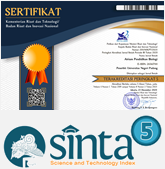The Influence of Problem Solving Models on Science Process Skills of Students in the Material Excretion of Class VIII SMPN 34 Padang
Abstract
The problem of research at SMPN 34 Padang is the low level of Science Process Skills of students from the results of previous observations by carrying out tests conducted in class VII SMPN 34 Padang, showing the average science process skills of students is less than 50%. This study aims to look at the effect of the Problem Solving Model on Science Process Skills in Grade VIII students of SMPN 34 Padang. In Indonesia, science process skills are very minimal, because in the learning process the teacher still tends to use the lecture model and question and answer method, so the science process skills are not given to students. This type of research is quasi-experimental with research design Control Group Posttest Only Design. The population in this study were eighth -grade students of SMPN 34 Padang in the academic year 2018/2019. The samples from this study were class VIII6 as the experimental class and VIII7 as the control class. The research instrument used to view the science process skills of students is the Observation Sheet for Student Activities observed by the observer. Based on the results of research on science process skills of students, the t count 4.96> t table 1.67 The Science Process Skills Activity of students in the experimental class was higher than the control class. The study concluded that the application the Influence of Problem Solving Models on Science Process Skills of Students in the Material Excretion of Class VIII SMPN 34 Padang
Keywords
Full Text:
FullpaperReferences
Anwar, H. 2009. Penilaian Sikap Ilmiah dalam Pembelajaran Sains, Jurnal Pelangi Ilmu. (2).
Alberida, H., dkk. 2018. Problem Solving Model for Science Learning. IOP Conference Series: Materials Science and Engineering. 335 012084
Anugrah, N. 2013. Pengaruh LKPD Berbasisi Pq4R Terhadap Hasil Belajar IPA Fisika kelas VII SMPN 1 Linggo Sari Baganti. Pilar of Physic Education. 84-115.
Becker, V. J. 2004. Innovative Assesment for the 21st Century. USA: Spinger.
Herawati, S. 2000. Pendidikan MIPA Tingkat Dasar dan Menengah Era Globalisasi di Filipina. Prosiding, Seminar Nasional. Yogyakarta: FMIPA UNY.
Hidayati, A. 2010. “Pengaruh Possitive Thinking Terhadap Kemampuan Menyelesaikan Masalah (Problem Solving) Pada Peserta didik”. Skripsi. Salatiga : STAIN.
Komariah, K. 2011. Penerapan Metode Pembelajaran Problem Solvinng Model Polya Untuk Meningktkan Kemampuan Memecahkan Masalah Bagi Siswa Kelas IX di SMPN 3 Cimahi. Prosiding, Seminar Nasional Penelitian,
Mu’awanah, S. 2018. Pengukuran keterampilan Pemecahan Masalah Siswa SMA Kelas x Kabupaten Klaten. JIPVA (Jurnal Pendidikan IPA Veteran). Volume 2: Nomor 1.
DOI: http://dx.doi.org/10.24036/apb.v5i4.6763
DOI (Fullpaper): http://dx.doi.org/10.24036/apb.v5i4.6763.g4100




